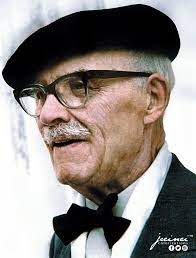Tudor Arghezi (1880 –1967) was a Romanian writer, best known for his unique contribution to poetry and children's literature.
Born Ion N. Theodorescu in Bucharest, he explained that his
pen name was related to Argesis, the Latin name for the Argeș River.
He made his debut in 1896, publishing verses in Alexandru Macedonski's magazine Liga Ortodoxă under the name Ion Theo.

After the outbreak of World War I, Arghezi wrote against the political camp led by the National Liberals and the group around Take Ionescu, both of whom aimed to have Romania enter the conflict on the side of the Entente (as an attempt the conquer Transylvania from Austria-Hungary).
During World War II the newspaper Informația Zilei published comments by Arghezi, as a column named after his former magazine, Bilete de Papagal. In 1943, it published virulent satires of the Romanian government, its military leader – Ion Antonescu, and Romania's allegiance to Nazi Germany.
The authorities confiscated all issues, and the author was imprisoned without trial in a penitentiary camp near Târgu Jiu, in which communist political leaders Gheorghe Gheorghiu-Dej, Nicolae Ceausescu and Ion Gheorghe Maurer were also imprisoned.

A controversial intellectual, Arghezi had a fluctuating
relationship with the newly established Communist regime. Although he was
awarded several literary prizes under during the period of Soviet-induced
transition to a people's republic, he became a harsh critic of censorship and
agitprop-like state control in media and was targeted as a decadent poet very
soon after the communist-dominated republican institutions took power (1948).
Once exonerated, he started being awarded numerous titles
and prizes. Arghezi was elected a member of the Romanian Academy in 1955 and
celebrated as national poet on his 80th and 85th birthdays. Although never
turned-Socialist Realist, he adapted his themes to the [socialist] requirements.








No comments:
Post a Comment